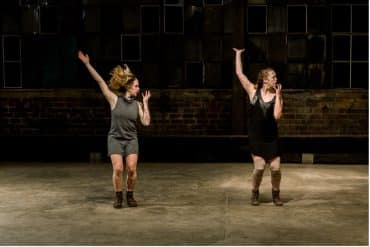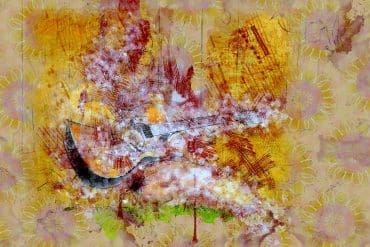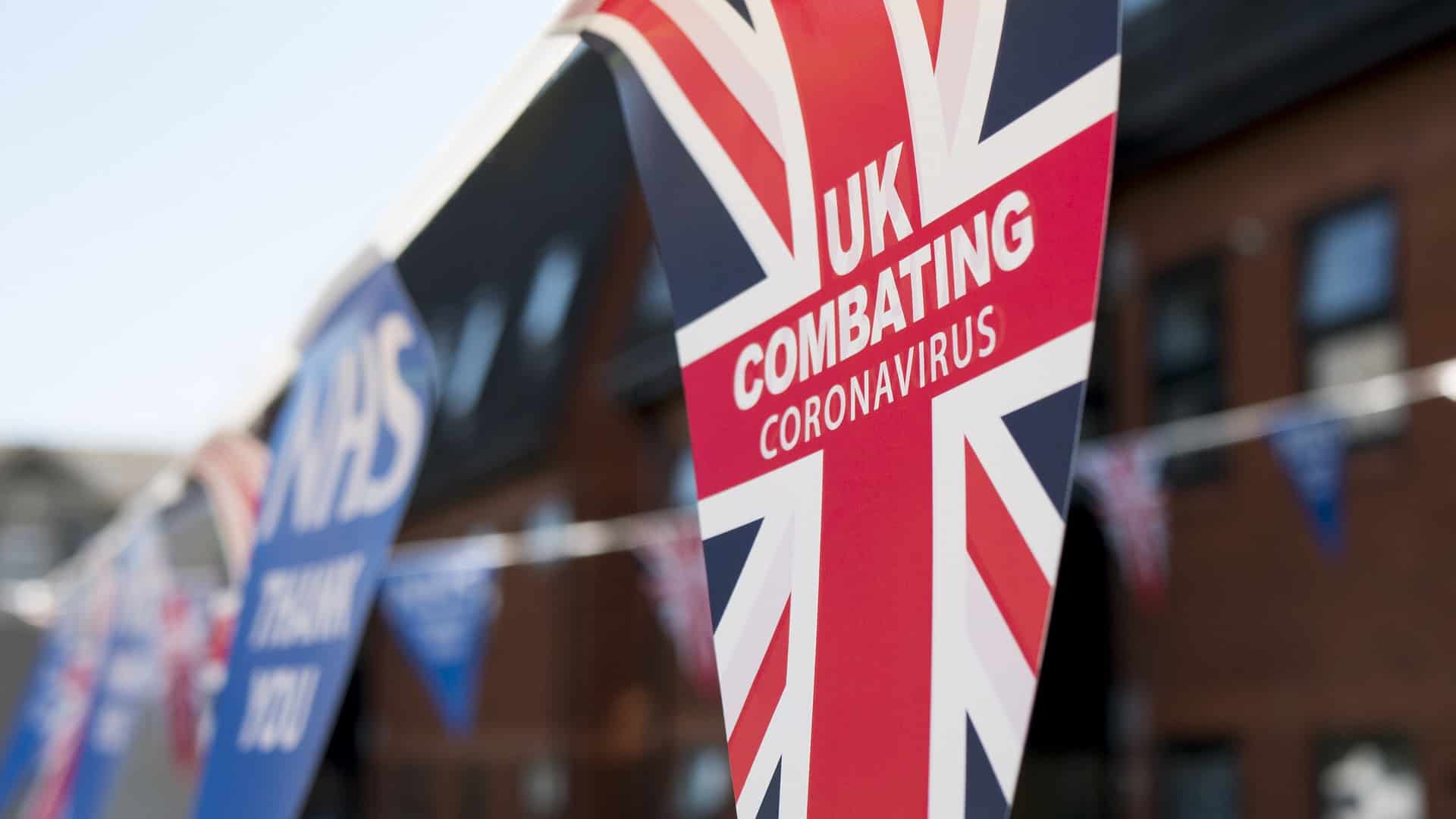With every second she realises how she gets more and more agitated. She can’t smell. That’s not a good sign. She has been so careful at work; she has had all of her shopping delivered for weeks, actually for months, now; she’s even wiped down the items with bleach as they are delivered, and still does. How can this have happened?
Wednesday, 18th March 2020
“Luke, stop annoying your sister! Libby, stop shouting! Get the table ready for dinner, both of you! It won’t be long now!” Hannah watches the pot with pasta, stirs the tomato sauce and turns up the volume on the television. The daily press briefing is going to start any time now, and Hannah hopes that this time the news will be good.
“Mum! Luke stole my crayons!”
“I did! Because Libby is taking up all the space!”
“Libby! Luke! Stop it! Both of you! There’s the Prime Minister! The briefing is about to start!”
Hannah is amazed. Usually, the kids wouldn’t end their squabbles that quickly, but obviously today is all about what happens next. Taking the bubbling pot off the hob, Hannah listens intently to the Prime Minister’s voice.
“…so, looking at the curve of the disease and looking at where we are now – we think now that we must apply downward pressure, further downward pressure on that upward curve by closing the schools. So, I can announce today and Gavin Williamson is making a statement now in House of Commons that after schools shut their gates from Friday afternoon, they will remain closed for most pupils…”
“Hurray! Yay!”
“Yippie!”
“School’s closed, school’s closed!”
The sudden explosion of noise in the small flat is deafening.
“Luke! Libby! Stop shouting! Stop jumping on the sofa!”
“School’s closed, school’s closed!”
“Stop jumping on the sofa!”
“Just one more time! School’s closed!”
“Not for you two!” Hannah mutters more to herself than the two overexcited children. But she must have spoken loudly enough, as Luke asks, “What does that mean, Mum?” Now Libby is also on tenterhooks. She must have sensed her older brother’s concern.
“Well, kids. You both know that your mum is a nurse in a hospital. And I am needed more than ever now. This virus is so dangerous that all hands are needed. I am going to have to go to work. I cannot work from home.”
“What’s that got to do with us?” Luke probes.
“You two are 8 and 10. You are too young to be at home by yourselves. So, you will be going to school, so I can go to work.”
“But, that’s not fair! Everyone else gets to stay at home!” Luke is defiant. “Why can’t you have a normal job, like everyone else’s mum? Why do you have to be a nurse?”
“Yeah. Why?” Libby chimes in, and they both stomp out of the kitchen.
This is the last thing Hannah wants or needs. She is exhausted. She has been tired after having lost three patients in one day last week. This is no laughing matter and the measures of this lockdown are not a day too early. But, of course, she understands the children. All their friends will be at home, when they have to go to school. It truly is unfair on them. After all, they haven’t chosen an NHS nurse for their mum. Well, they do have a dad, and he has a second wife! Perhaps Richard and Sofia will pitch in?
Friday, 20th March 2020
“Come on, Richard! You cannot be serious!” Hannah is exasperated. “You know that your mum is not well. She’s been complaining about headaches and a sore throat for a few days, now. Sofia told me. And now you want her to watch the kids? Who knows what germs they bring home from school!”
“Well, Hannah. Whether you like it or not. I am their father and my mum is their grandma. We have a right to decide for ourselves how we want to care for Libby and Luke. I don’t want Sofia to do the childcare. So, my mum will.”
“What about you, Richard? Why can’t you look after them?”
“As it happens, I have plans today. I am busy with work, and shopping, and I have arranged to meet a few people for a couple of drinks. Just one more time.”
“What? Don’t you think you should be staying at home?”
“Well. I will have to, anyway. I mean it’s only a question of time for them to announce they are shutting everything down. Wouldn’t be surprised if that briefing today will be about that. But that doesn’t mean I have to stay at home tonight.”
Hannah cannot remember how she was able to end the conversation in a civilised manner. Maybe it wasn’t civilised, anyway. But these next few weeks are going to be difficult, to say the least.
Sofia continues to be in touch with family back home to be close to them. But being that close to them also means feeling their pain. It’s the burden of being at home away from home.
Monday, 20th April 2020
It has been a long day for Richard. He’s just had enough of everyone talking about this whole COVID thing. It was kind of ok at first, but now this is really out of order. It’s as if nothing else matters anymore. COVID this, COVID that. Lockdown, school closures, pubs shut. What kind of life is this? He cannot wait to get home.
“Oh, for God’s sake!”
Turning the key in the door, Richard can already hear the bum, bum, bum sounds from the living room. “Una volta ancoooora,” Sofia is obviously listening to some Italian rap again. Not that this is proper rap anyway.
“Soph? What’s up?” Richard asks.
Sofia turns towards him.
“Not again, Soph! Have you been crying all day?”
Richard is at a loss. Of course, Sofia has always been passionate. That is one of the character traits he has always liked in her. And he has always assumed that this was the Italian in her. But lately, this constant negativity, and crying has been rather irritating. And since Easter it’s been unbearable.
“I can’t help it, Richard! It’s just all so overwhelming. In Italy, this COVID epidemic has killed so many people, and now it is here, too.”
“Soph, it’ll be fine!”
“Richard, I don’t think you understand! I have already lost my grandma, my great uncle and my cousin. And I haven’t been able to be at their funeral!”
“Oh, for crying out loud, Soph. It’s not like they would have noticed your absence!”
“Well, let’s hope all of this doesn’t affect you. I for one am struggling with not being able to see family, and not knowing if I ever will see my parents again. I appreciate that it’s much easier for you, with your mum just around the corner and your kids down the road. But you don’t seem to know what you have!”
“Well, if you want to, you get to play happy family! You wanted to go home and help your sister with her children. You can have Libby and Luke. Hannah needs to go to work, obviously. And schools are still shut. But she doesn’t want Libby and Luke in school all day every day. So, we’ll have Libby and Luke some of the time, and my mum will watch them at other times.”
For the first time in weeks, Sofia feels something other than sadness, worry and anxiety. Could this be a glimmer of hope? An inkling of being useful and needed? She likes Libby and Luke; and the children seem to enjoy being with her, too. And if this helps Hannah out, then just the better. As Richard’s second wife, she will never be a friend to Hannah, and she understands that. But had circumstances and life been different, they could have actually been friends. Their approach to this whole COVID situation has been very similar. In fact, Sofia and Hannah are more aligned in their views about social distancing than Sofia and Richard are. Richard thinks that because he is not vulnerable or at risk, he doesn’t need to change his lifestyle at all. Obviously, Hannah has seen what happens, she sees it every day. It is not surprising that she is trying everything possible to avoid contact with people. And Sofia herself feels like she has already lived through the pandemic for several weeks. Despite the physical distance, despite the borders being shut and despite no travels being allowed into and out of Lombardy, Sofia continues to be in touch with family back home to be close to them. But being that close to them also means feeling their pain. It’s the burden of being at home away from home.
Thursday, 21st May 2020
“Mummy? How long is it going to be like this still?” Libby asks.
“Yes, mum. How long? It’s been two months already!” Luke chimes in.
Hannah is tired. What can she say? That this new virus will always be a part of their lives from now on? That nobody will ever be able to go back to what it was like before. To her this is like the Twin towers. The 09/11 attacks are forever burnt into collective memories and have made it into history books. Before and after the Towers.
Now, it is before and after COVID.
“Mum?”
“Mummy?”
“I don’t know, sweethearts. I just don’t know. I do know that things are getting better. In the press conferences they are talking about opening shops and markets. And we have been able to go outdoors a bit more recently, haven’t we?”
“Yeah, but I miss Nathan and Dan.”
“And I miss Izzy, Leah, Summer and Chloe. I really want to play with them like we used to.”
Hannah feels the same weariness that her children feel. With the exception that she also feels the weight of the daily grind in the hospital. People being so ill that there is nothing much to do anymore, other than make them comfortable. If some of their patients were to come in earlier, they would perhaps have a chance to survive. But, of course, at the moment everyone is scared of going to hospital. They don’t want to overwhelm the hospitals or staff, and they don’t want to risk catching COVID there. Truth is, though, as they wait that long before they go to hospital, it is their death sentence. How shall Hannah ever get over this?
“Mum? Are you ok?”
“Of course, pumpkin.” Hannah steadies herself one more time. She cannot let her children see the pain she feels. They deserve to grow up the way she did, with no worries. Their reality is tough enough, she doesn’t need to add to that. “Time for dinner, right, sweeties?”
“Oh, for goodness sake! How long do you want to shut yourself away? When are you going to start living again? I’m not willing to live in fear for the rest of my life. I mean, even my mum goes out and meets people.”
Tuesday, 23rd June 2020
“Ha! Did you hear, Soph? They will open stuff. Pubs, restaurants, hotels. We can go on holiday after all!”
“I know you’re excited about this. But I am not sure we should go crazy with going out. I mean you have been shopping recently, anyway.”
“Oh, for goodness sake! How long do you want to shut yourself away? When are you going to start living again? I’m not willing to live in fear for the rest of my life. I mean, even my mum goes out and meets people.”
“Well, your mum is over 80. She says that she has had a good life and for her it is neither here nor there, if she dies now. But we are not, Richard!”
“We are all wearing masks anyway.”
“Really? I’m telling you one more time. Having a mask around your neck or under your chin doesn’t count!”
“Well, I’m telling you now. Come that 4th of July, I will go out for a meal with Libby and Luke. And you can decide on whether you want to come or not.”
Saturday, 18th July 2020
“Can you let me smell it, again? Just one more time, please, Libby.”
Hannah takes the small strawberry lip care stick off her daughter.
“Oh, please, mum, don’t take it away. It’s not proper lipstick anyway! Daddy said it would be ok for me to have.”
“Libby, sweetie. It’s fine, don’t worry. I would just like to smell the strawberry flavour.”
Hannah pushes the Vaseline stick up and tries to smell the strawberry. She is not silly, she knows that it doesn’t really smell of strawberry, anyway. But she can’t smell anything. With every second she realises how she gets more and more agitated. She can’t smell. That’s not a good sign. She has been so careful at work; she has had all of her shopping delivered for weeks, actually for months, now; she’s even wiped down the items with bleach as they are delivered, and still does. How can this have happened? Sofia did say the other day that Richard had been coughing. In fact, Sofia had asked her for guidance. Not that Richard would have followed the instructions to stay at home and isolate. And he still wanted to see the kids, and the kids him. He is their father after all. But what now?
Sunday, 19th July 2020
“It’s ok, Hannah. I can imagine how worried you are. I have tried to talk some sense into Richard. But you know what he’s like.”
For Hannah this is weird. She is on the phone to Sofia, the other woman. But actually, Sofia seems to understand her worries and her pain better than anyone else at the moment. Of course, people at work would, but with what’s been going on you don’t bring that kind of thing to work.
“Thanks, Sofia. I’m sorry to be offloading and venting.”
“Honestly, Hannah. I am pleased I can be of help. I have felt quite useless for a long time, and if it helps, me being here and listening, that’s great. And it is actually not such a self-less act. It helps me, too.”
“Well. Perhaps I will ring you again, one more time.”
AUTHOR’S MEMO
Autoethnography offers a systematic framework for “writing” (-graphos) about “our selves” and “personal experiences” (autos-) to make sense of what is happening in society (-ethnos-). Therefore, when the first wave of COVID19 cases and deaths from the global Coronavirus pandemic were reported from Italy in early 2020, I took this opportunity to write and journal about my experiences. I realised that as a society we had found ourselves in unprecedented times leading to emergency strategies like travel bans, social distancing and self-isolation, which all caused drastic changes to individuals’ lives.
Drawing on crystallization (Richardson, 2000) as a methodological framework and process (Ellingson, 2009), I think with stories (Frank, 2013) and use writing as a method of inquiry (Richardson, 2000, 2003) to illuminate data, such as social media posts and news accounts (Ellingson, 2009, 2017), and extrapolate meaning that would otherwise stay hidden or forgotten. This form of analysis and inquiry engages with the radical specificity of experiences, thus the otherwise subjugated and marginalised (Ellingson, 2017). Tending to radical specificity reflects a deeper engagement with “unfamiliar connections and relations that move both beyond and against the familiar storylines” (Sotirin, 2010, n.p., section 7) and “cultural clichés” (Ellingson, 2017:178).Evocativeness, expressiveness and transformation are not intentional but natural by-products of readers engaging with similarities and differences in experiences and “think[ing] beyond the dominant, the familiar and the common” (Sotirin, 2010, n.p., section 7).
The fictionalised account tells the story of NHS nurse Hannah and her ex-husband Richard, who disagree on the rules and guidelines for social distancing, but who are forced to navigate their differences because they are the joint carers for their 8-year-old daughter Libby and 10-year-old son Luke. The themes of empathy and lack thereof are further explored through Richard’s second wife Sofia. Sofia is Italian by birth and still has family in Italy, but due to travel restrictions and closing of borders, she is unable to visit her family. This results in Sofia experiencing tensions within herself between being “at home” whilst at the same time being “away from home”. The story is told over the space of several weeks, from the different characters’ perspectives, which highlights how an extreme experience like the current pandemic results in people coming together, whilst being pushed apart from one another at the same time. Through the fictionalisation, I demonstrate the impact of the COVID19 emergency measures on individuals and society by exploring the microcosm of the family as a metaphor for entire cultures and societies.
References
Ellingson, L.L. (2009). Engaging Crystallization in Qualitative Research: An Introduction. Sage.
Ellingson, L.L. (2017). Embodiment in Qualitative Research. Routledge.
Frank, A.W. (2013). The Wounded Storyteller: Body, Illness, and Ethics. (2nd ed.). Chicago: University of Chicago Press.
Richardson, L. (2000). Writing: A method of inquiry. In: Denzin, N. & Lincoln, Y. (eds.). The SAGE Handbook of Qualitative Research. (2nded.). Thousand Oaks, CA: SAGE. 923-943.
Richardson, L. (2003). Writing: A method of inquiry. In: Lincoln, Y. & Denzin, N. (eds.). Turning Points in Qualitative Research: Tying Knots in a Handkerchief. Walnut Creek, CA: Altamira. 379-396.
Sotirin, (2010). Autoethnographic mother-writing: Advocating radical specificity. Journal of Research Practice, 6(1), M9.
Featured Photo by Groovelanddesigns for Pixabay










